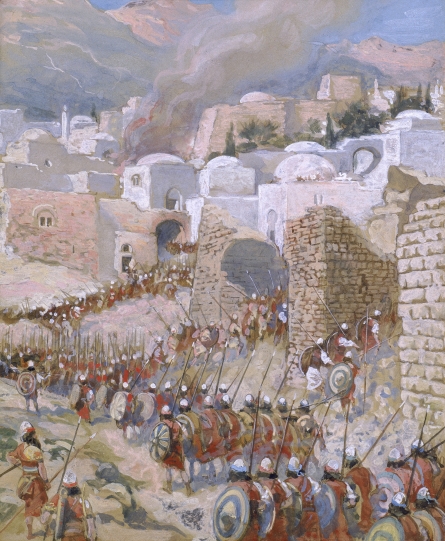Aug
6
2013
 Concerning James Jordan’s “maximalist hermeneutic,” Ros Clarke writes:
Concerning James Jordan’s “maximalist hermeneutic,” Ros Clarke writes:
In order to begin to grasp the depths of meaning contained within the text of the Bible, we need to become more like its ancient readers. For Jordan this involves becoming more alert to the kind of literary structures and devices that shape the text. He also notes that the Bible was originally intended to be heard, rather than read silently, and that this would promote greater awareness of the patterns and meanings of the text:
Continue reading
3 comments | tags: Greg Bahnsen, James Jordan | posted in Biblical Theology, Quotes
Aug
6
2013
 You Shall Likewise Perish
You Shall Likewise Perish
Peter Leithart has posted a response from Joe Rigney concerning the meaning of Luke 12-13. We had a look at the structure of these chapters here recently (See 666 in the Gospel of Luke), so I thought it would be interesting to see how these two approaches “speak to each other.”
Continue reading
Comments Off | tags: AD70, Joe Rigney, Literary Structure, Luke, Peter Leithart | posted in Bible Matrix, Biblical Theology, Quotes, The Last Days
Aug
3
2013
 Abraham’s Bookends
Abraham’s Bookends
In his book Why Baptize Babies?, Mark Horne writes:
The apostle Peter makes it clear that God’s Covenant still involves the promise to our children:
For the promise is for you and your children and for all who are far off, everyone whom the Lord our God calls to himself.” (Acts 2:39) We who now profess Christ are among those who are “far off,” whom the Lord has called to himself. Just like those to whom Peter first preached, the promise is not only for us but for our children as well. (p. 23)
So much that has been written about baptism is nebulous and confused. My friend Mark’s short book, however, is an excellent summary of this doctrine. Having his points honed into silver bullets makes them easier to discern, and easier to deflect!
Continue reading
3 comments | tags: Acts, Baptism, Covenant Theology, Luke Welch, Mark Horne | posted in Biblical Theology, Quotes
Aug
1
2013
“Every conception and form of liturgy that focuses on man will eventually degenerate into intellectual or psychological manipulation.”
More from Jeff Meyers on The Lord’s Service.
Continue reading
2 comments | tags: Ecclesiology, Jeff Meyers, Worship | posted in Biblical Theology, Christian Life, Quotes
Jul
30
2013
 Here is the first of a few excerpts from the condensed version of Jeff Meyer’s The Lord’s Service: The Grace of Covenant Renewal.
Here is the first of a few excerpts from the condensed version of Jeff Meyer’s The Lord’s Service: The Grace of Covenant Renewal.
Why Go To Church on Sunday?
When you come together as a church. . .
1 Corinthians 11:18
What is the purpose of our Lord’s Day assembly? Why do we come to a church service on Sunday? The answer to this crucial question will help explain why certain words and actions are included in the church’s worship and also determine the way in which the service is ordered from beginning to end.
Continue reading
Comments Off | tags: Ecclesiology, Jeff Meyers, Worship | posted in Biblical Theology, Quotes
Jul
26
2013
 Is the book of Revelation a “Covenant lawsuit”? It certainly follows the fivefold legal Covenant pattern. However, its prophetic warnings are not addressed to the Jewish leaders. It was too late for them. The book does describe the destruction of Jerusalem through “the testimony of two witnesses,” but Gary DeMar suggests it was more like a libretto for the Christian spectators. He writes:
Is the book of Revelation a “Covenant lawsuit”? It certainly follows the fivefold legal Covenant pattern. However, its prophetic warnings are not addressed to the Jewish leaders. It was too late for them. The book does describe the destruction of Jerusalem through “the testimony of two witnesses,” but Gary DeMar suggests it was more like a libretto for the Christian spectators. He writes:
Continue reading
Comments Off | tags: Corinthians, Covenant Theology, Galatians, Gary DeMar, Hebrews, Paul, Revelation | posted in Against Hyperpreterism, Biblical Theology, Quotes, The Last Days
Jul
24
2013
Most of the feedback I get is criticism, which is helpful for me — so it’s great to hear from someone who has been helped in some way!
From Pamela in the upper midwest, USA:
Continue reading
1 comment | tags: Baptism, Postmillennialism | posted in Bible Matrix, Biblical Theology, Quotes
Jul
16
2013
 “When Moses slew the Egyptian, he was doing the will of God but not with the power of God.”
“When Moses slew the Egyptian, he was doing the will of God but not with the power of God.”
Numbers 12:3 says that Moses was the meekest man “on the face of the ground [adamah].”
Psalm 37:11 says the meek will inherit the Land [eretz] and delight in abundant prosperity.
Isaiah 11:4 says that
with righteousness [God] shall judge the poor,
and decide with equity for the meek of the Land;
and he shall strike the Land with the rod of his mouth,
and with the breath of his lips she shall kill the wicked.
Firstly, what is meekness? And secondly, why is it connected to “face of the ground” (Adam), or Land?
This post has been slain and resurrected for inclusion in my 2015 book of essays, Inquietude.
Continue reading
Comments Off | tags: Ascension, Firstfruits, Genesis, Herod, Isaiah, James Jordan, Matthew, Moses, Pharaoh, Tabernacle | posted in Bible Matrix, Biblical Theology, Christian Life, Ethics, Quotes, The Last Days
Jul
5
2013
 or A Kingdom Mind
or A Kingdom Mind
The best part of the Avengers movie for me was the infighting among the super heroes, and how the conflict disappeared once they had a common enemy. Each hero was unique, with his or her special skills. As in any relationship, marriage, community or committee, the differences are misinterpreted as sources of conflict and competition instead of complementary strengths. Once the heroes were out on the ground, the comical infighting (and misuse of gifts) ceased, and they started operating like the well-tuned orchestra they were designed to be.
Continue reading
2 comments | tags: Baptism, Covenant Theology, Ecclesiology, Music, Peter Leithart | posted in Bible Matrix, Biblical Theology, Christian Life, Quotes
Jul
3
2013
 James B. Jordan was the first Bible teacher I ever heard who had an opinion on the gift of tongues in relation to the rest of the Bible. This gent cops a lot of criticism from the establishment for various things, but he is one who really “gets” the Bible. This is because he asks the right questions. And, without being too harsh, he most often makes all the other theologians and Bible teachers in any debate, on both sides of the debate, look like kindergarten children.
James B. Jordan was the first Bible teacher I ever heard who had an opinion on the gift of tongues in relation to the rest of the Bible. This gent cops a lot of criticism from the establishment for various things, but he is one who really “gets” the Bible. This is because he asks the right questions. And, without being too harsh, he most often makes all the other theologians and Bible teachers in any debate, on both sides of the debate, look like kindergarten children.
Continue reading
1 comment | tags: AD70, Babylon, Corinthians, Luke Welch, Numbers, Systematic typology, Tongues, Trumpets | posted in Biblical Theology, Quotes, The Last Days
 Concerning James Jordan’s “maximalist hermeneutic,” Ros Clarke writes:
Concerning James Jordan’s “maximalist hermeneutic,” Ros Clarke writes:































